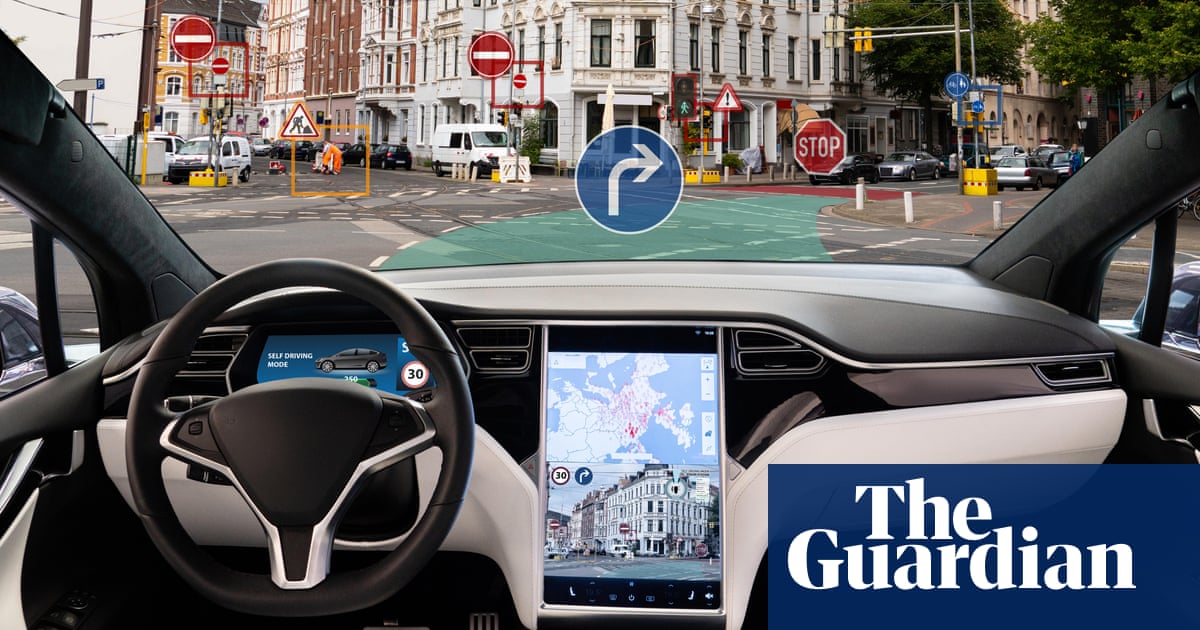
Motorists could legally allow their cars to “self-drive” on British motorways later this year – but only slowly, the government has announced.
Drivers could soon be allowed to read a newspaper or watch a film via the car’s built-in screen in periods of slow-moving traffic, using automated lane-keeping system (Alks) technology that makes the car stay in lane and a safe distance from other vehicles.
But insurers and motoring organisations said much more work needed to be done to ensure safety, after the Department for Transport confirmed it would pursue plans to allow new models fitted with Alks to drive without the driver’s input.
The cars will be defined as self-driving when the system is in operation, at a maximum speed of 37mph. According to the DfT, the technology, which will constantly monitor speed and distance from other cars, could improve road safety by reducing human error.
Under UN regulation, the system is for use only on motorways, where traffic flows in the same direction and no pedestrians or cyclists are permitted. It must hand back control to the driver when required, such as when a traffic jam clears and traffic speeds up, with up to 10 seconds for the transition.
A fresh consultation on the Highway Code has been launched to examine what rules are needed to ensure Alks is used safely.
Transport minister Rachel Maclean said it was a “major step for the safe use of self-driving vehicles in the UK, making future journeys greener, easier and more reliable.
“But we must ensure that this exciting new tech is deployed safely, which is why we are consulting on what the rules to enable this should look like.”
However, insurers warned that the government was sowing confusion over the capabilities of the cars by referring to models with Alks as “self-driving”.
Matthew Avery, director of research at the insurer-funded Thatcham Research, said: “There is still a lot of work needed though by both legislators and the automotive industry before any vehicle can be classed as automated and allowed safely on to the UK roads.”
He said Alks should not be called automated as it still relied on a driver being ready to take control. “Our concern is that the UK government is contributing to the confusion and frequent misuse of assisted driving systems that have unfortunately already led to many tragic deaths.”
The deaths of two men in a Tesla crash in April is under investigation in the US, with no one believed to have been in the driving seat. An inquest last year found another Tesla driver was using the car’s self-driving function and playing a video game when he died in 2018.
The AA also urged caution. The motoring group’s president, Edmund King, said: “Without doubt vehicle safety technology can save lives, but we shouldn’t be in a race to take drivers’ hands off the wheel.
“There are still gaps in how this technology detects and stops if the vehicle is involved in a collision. There are still question marks over how drivers will be fully informed how these systems work. More needs to be done to rigorously test these systems before they are used on UK roads.”
However, the Society of Motor Manufacturers and Traders said the government’s announcement was a vital step forward.
The SMMT chief executive, Mike Hawes, said: “Technologies such as Alks will pave the way for higher levels of automation in future – and these advances will unleash Britain’s potential to be a world leader in the development and use of these technologies, creating essential jobs while ensuring our roads remain among the safest on the planet.”
The government has pinned significant economic hope on connected and autonomous vehicle technology, which it claims could be a £42bn industry employing another 38,000 people in the UK by 2035.












